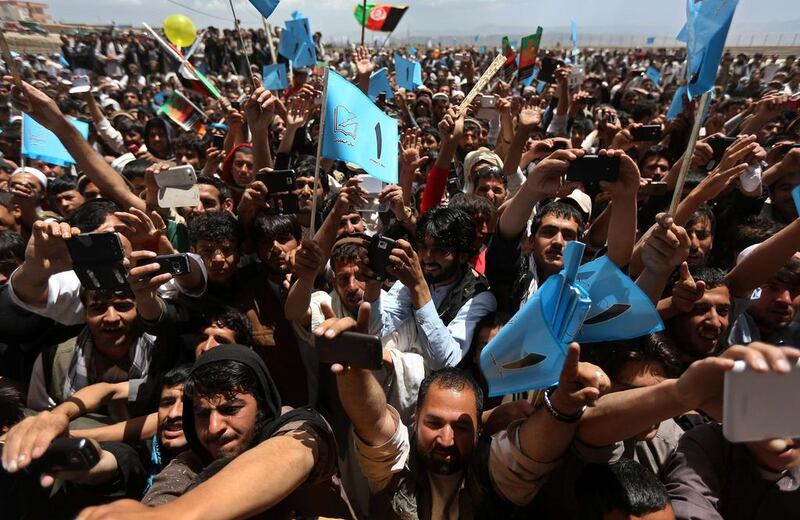The international community must look beyond outgoing Afghan president Hamid Karzai and focus on developing a long-term relationship with Afghanistan, says Gianni Koskinas, a Kabul-based consultant who is focused on fostering development in Afghanistan and a former US Special Operations officer.
In my heart, and I live in Kabul so I vote with my feet, I believe that there is a serious promise of something better coming to Afghanistan in the next months.
At the moment, the discussion is focused on security issues. No one wants to talk about the economy and what would actually improve the lives of individual families, things that will actually make people stop picking up guns.
Unless you have a national vision that includes some big projects that will put people to work, all the security that you bring to bear is relative or temporary because you won’t have people in jobs. Security versus economy – it’s not a chicken or egg question.
People give almost cheerleader-like speeches about the trillions of dollars in resources in Afghanistan. The Silk Road goes through the country, they say.
That’s fantastic but, unless there are some real concrete steps, we won’t unleash that potential.
There are incredible resources in Afghanistan, it’s true. First, the human resources. There’s an educated group that are coming up now.
They are incredibly entrepreneurial. They are a wily bunch of people who can get things done.
But instead of just dumping money in here, the international community should consider a long-term economic commitment that includes big projects that will actually make economic growth happen.
The commitment should be about rebuilding at a steady rate and helping with projects that will be hubs of economic development. The next step is private investment.
I have a real problem with the fact that the international community has not done a good enough job of fostering private investment in Afghanistan in a way that will improve the country’s economic outlook in the following years when the donor funds start to diminish.
For all the money we’ve spent in Afghanistan it’s still a landlocked country with no railroad to the Arabian Sea.
There are projects that could happen in the country that could transform the region, not just one particular province; a railroad to Gwadar port is the perfect example.
Someone might say those big projects would be really expensive.
But let’s compare what we’ve spent on micro projects to what could have been spent on a mega project.
Imagine if someone told the leaders of the UAE that it’s going to be really expensive to transform Abu Dhabi or Dubai. If you don’t have the vision to transform the area all the money in the world can’t do it.
This long-term commitment to Afghanistan is vital because the country is important for many reasons.
It’s not just the fight against Al Qaeda, though I would submit that we can’t declare victory against them. That movement will morph into something else. You need to be able to pursue it. The US can do this with its partners. It can’t do a unilateral pursuit of terrorists.
The best thing we can do is strengthen the capabilities of the states in this region, which is a long-term thing. You have to stay to do it.
You should have a base in Afghanistan to be able to do some of the things you want to do in terms of strategic view. Not because you have goals of invasions, which is totally nonsense.
Staying within a context of a strategic partnership will be a source of stability and strength because the Afghans are getting something out of it as well.
After the final round of the presidential election there will be a new government, a new focus on building Afghanistan’s relationship with the international community, which the current president, Hamid Karzai, has not focused on.
His vitriol when he talks about the West is obviously meant to appeal to extreme portions of his domestic audience. While his statements have not been connected to attacks on foreigners, Karzai is driving a perception of an anti-western atmosphere. Many foreign organisations now must operate outside the country.
But I think there will be change with a new president and I am hoping that the business environment will change because Karzai’s team has not been business-friendly.
There has been corruption; there is a problem that one day he calls the US an ally, the next he treats the US like an enemy. The relationship has evolved into something that is, quite frankly, unworkable.
Just think, we could not get the bilateral security agreement signed even though it’s not contentious. The Loya Jirga approved the measures, but Karzai still doesn’t want to be the guy that signs the paper.
The ideal US commitment is a long-term commitment. You do not start by introducing one or two-year timelines to a relationship. That’s not how it works in Afghanistan and that’s not how it works in many countries. At the same time, Afghanistan’s commitment to the world needs to be about progress and a roadmap towards peace.
Relationships between countries are reflections of a much bigger aspect: it’s between people.
foreign.desk@thenational.ae





